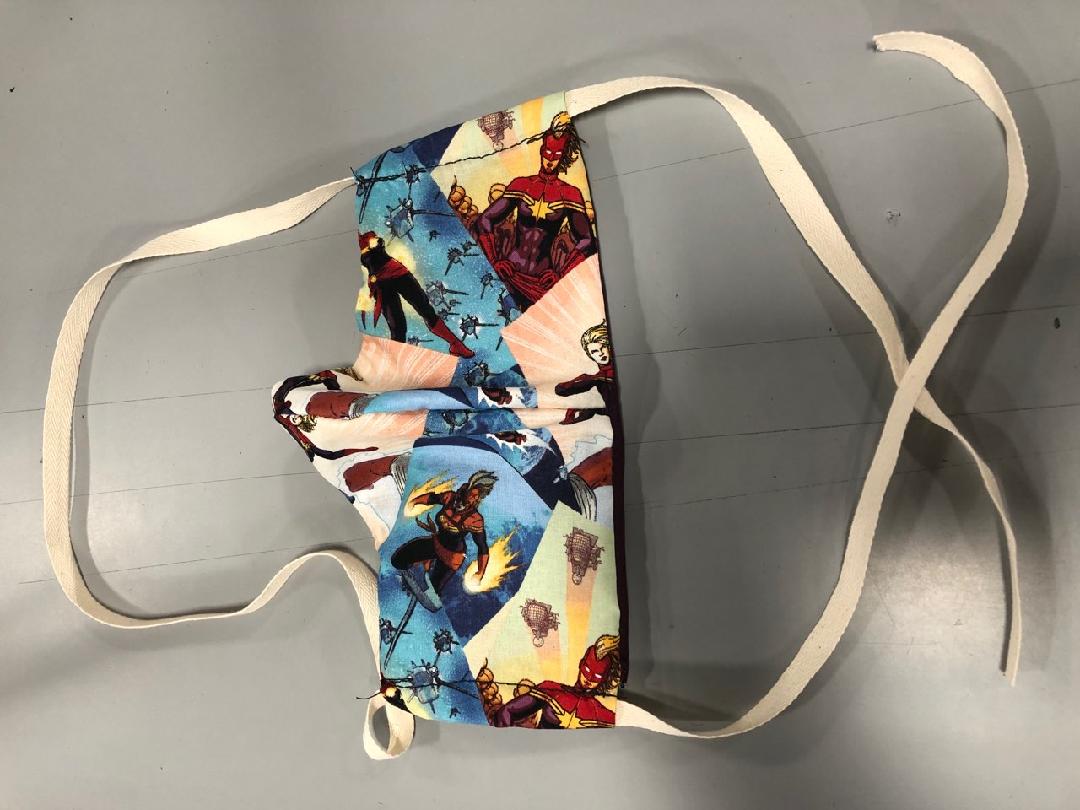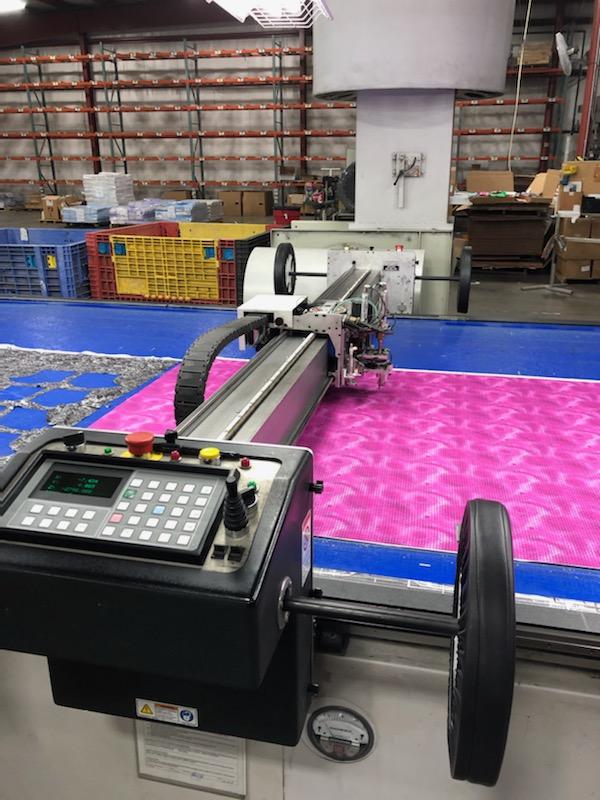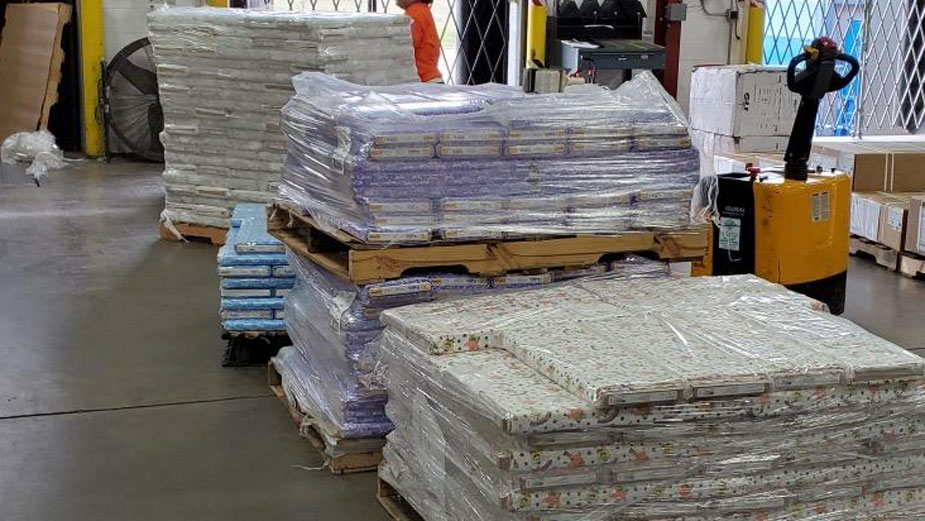GLI Pool Products Ready to Make 100K Masks
YOUNGSTOWN, Ohio – All told, there’s not much difference between cutting the fabric needed for medical workers’ masks and the vinyl to make pool liners. That’s why, with enough fabric to make 100,000 masks, GLI Pool Products is turning its efforts to fighting the spread of COVID-19.
“We have to change our cutting tables over to a different file. That’s not hard. Our sewing machines are designed to build safety covers, which is a much different product than these delicate masks, so there are adjustments there,” said GLI owner Gary Crandall. “But it’s not difficult. It’s really just moving from one product to another. It’s not rocket science.”
The challenge, he says, has been keeping up with the automated cutting machines. GLI staff have been making the masks on the Youngstown company’s production floor. But with the arrival of material from Joann Fabric Thursday night, Crandall put out the call for volunteers to pick up the fabric, along with the metal nose clips, to make masks at home. By 8:30 Friday morning, the company had received nearly 150 responses.

“It’s gotten to almost an email a minute,” he said. “We’re getting local sewing groups and others that are offering their help. … People have been generous with materials, donating string and the like that we need to complete these masks.”
For those looking for work, GLI’s Crandall said the company is also hiring sewers to make the masks in-house.
Also part of the effort is Gasser Chair. Early Friday morning President Mark Gasser, sent a truck out to pick up materials from GLI and had called in sewers.
“They’re much less complex than the sewing our seamstresses are used to. I expect this to go through without a problem,” he said while waiting on the material to arrive. “There are a few things, like the wire across the nose bridge, that we’ve never done before, so there will be a learning curve, but I’m confident folks will adapt quickly.”
For much of the past week, staff at Gasser Chair hadn’t been at work as the company complied with Gov. Mike DeWine’s stay-at-home order for all but essential businesses. Most Gasser customers – along with the company itself – fall on the list of those deemed nonessential. Those that do remain have bigger concerns right now than furniture, Gasser said.
“We’ll be calling back those that we think can provide the most help. It’s still a scenario that’s unfolding, but the goal is to get these masks and whatever else we can produce into the hands of caregivers and frontline workers,” he said. “We’re taking all precautions possible. There’s plenty of space; we won’t have people on top of each other. We won’t bring people who are high risk.”
GLI’s turn to medical masks was born out of a desire to help fight the coronavirus and the knowledge that the company has made similar pivots before as well, Crandall says.

“I’m watching the news the same as everyone else. There’s a need and we can do it, so why not step up?” he said. “It harkens back to the early 90s when we pivoted our plant over to making modular ammunition solar shades for the Gulf War to cover M1 tanks and munition dumps. … We did that for months. We’ve pivoted before to a war effort. This is a silent war with an invisible enemy.”
The company had reached out to the Federal Emergency Management Agency, Health and Human Services and DeWine’s office to offer its aid however possible, Crandall said. After being told the company “would be a put on a list,” he decided that the company would start work on its own.
“All we kept hearing was masks, masks, masks,” he said. “I had seen somewhere that Joann Fabric had the materials available by the yard, so we went out there,” and GLI was put in touch with the hobby store’s district office. Crandall and GLI were told to order as much as they needed from the Boardman and Niles stores.
“We had a lot of fabric and the balance of it arrived [Thursday] night. We still have product inbound for the tie strings and nose clips,” he said. “There are a few components, but the cutting is what takes time. We have them running now and I’m sure they’ve been going all night.”

The masks aren’t the high-grade ones used in the intensive care units with COVID-19 patients, Crandall said, but are meant to be used by medical workers elsewhere who need any sort of protection.
“There’s a surgical mask made with specific materials that’s simply not available. If it were available, it should be going to someone like 3M who can make millions a day,” he said. “What we’re making is a relatively simple mask. It covers the nose and face and is made of two-ply cotton. It has a pouch inside to hold a shield. What we’re hearing is that people on the front lines are stuffing them with tissues or coffee filters or paper towels for some extra protection.
“The people reaching out [for these] don’t have any protection.”
There’s no goal for how many masks GLI and volunteers will make, Crandall said. As long as GLI can get the material and there’s demand, the masks will be made.
“If it’s a month, it’s a month. If it’s two months, it’s two months,” he said. “I never had a beginning and end spot in mind for this. We’re just trying to do our part.”
Copyright 2024 The Business Journal, Youngstown, Ohio.



